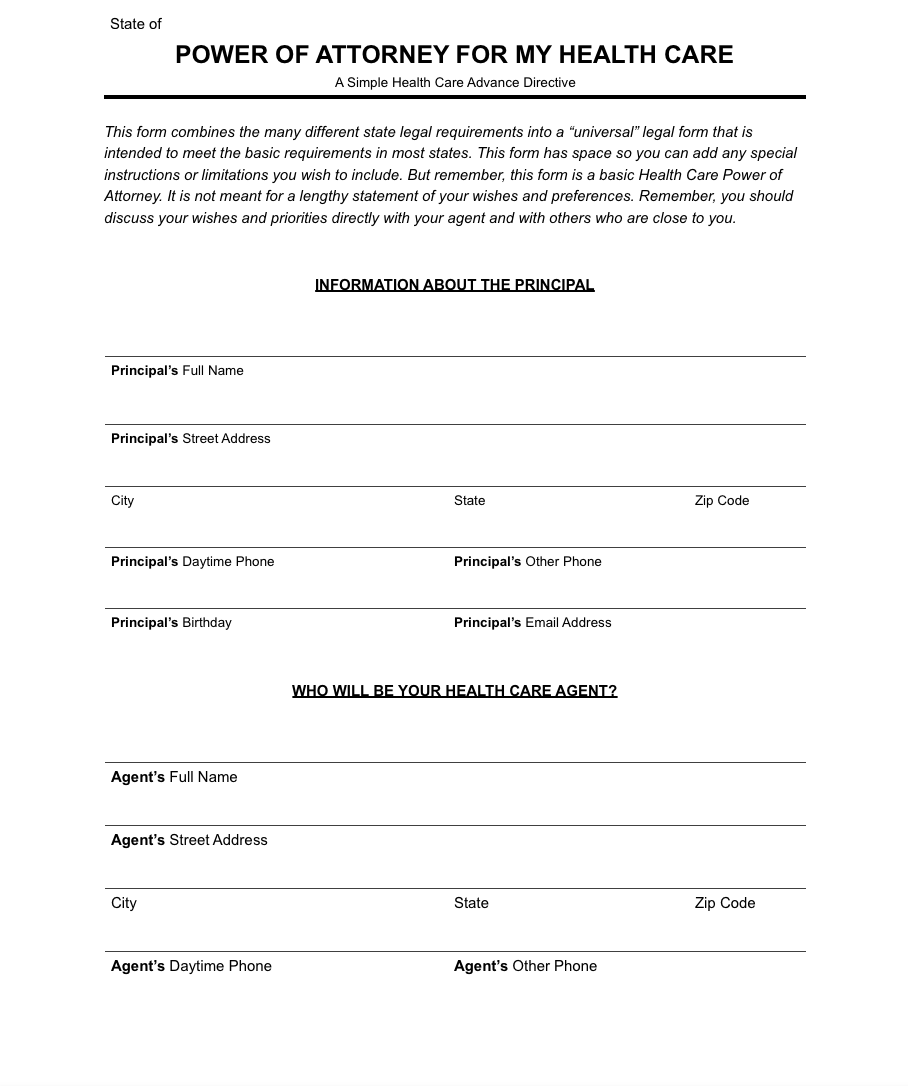Free Medical Power of Attorney (MPOA)
Use our Medical Power of Attorney to authorize someone to make medical decisions on your behalf.
-
1
Choose a form
Browse and select the document you need
-
2
Answer Questions
Go through our builder and complete your form in 5 minutes
-
3
Download & E-sign
Receive your document in PDF or Word format
 Create Document
Create Document
- Download as PDF and Word
- Access from desktop, tablet & mobile
- E-signature
- Yearly Updates & Notifications
A medical power of attorney gives someone you trust the power to make medical and treatment decisions on your behalf if you cannot do so.
What Is a Medical Power of Attorney?
A medical power of attorney, or MPOA, is a directive that lets you decide ahead of time who can make medical decisions for you if you cannot communicate your wishes.
Suppose you are in a coma or declared incapacitated due to dementia or Alzheimer’s disease or otherwise unable to decide for yourself. In that case, an MPOA lets someone you trust carry out your healthcare instructions.
MPOAs are sometimes called advance directives, healthcare proxies, or durable powers of attorney. You can find a free medical power of attorney form online, and hospitals and healthcare providers also have them.
Why Do You Need an MPOA?
A medical power of attorney is a legal document that lets you determine what you want done if you can no longer make medical decisions for yourself.
If you do not have one, the court must appoint someone, usually a family member, to act on your behalf. Sometimes, this family member may not know precisely the medical care you wanted or may not have been the person you wanted to act as your health care agent.
Your medical power of attorney gives you control over what will happen to you if you are declared unable to make your own decisions.
Although most people think of MPOAs as something they might need if they were in a coma or considered brain dead, a medical power of attorney is significant if you have a family history of Alzheimer’s.
When Do You Use a Medical Power of Attorney?
An MPOA only becomes effective when your physician declares you are incapacitated or unable to make your healthcare decisions.
For instance, if you have Alzheimer’s, your doctor must attest (swear under oath) that you cannot make your own medical decisions before your agent can use the medical power of attorney to make decisions for you.
What to Include in an MPOA
Whether you use a free Medical Power of Attorney online or you get one from your primary care physician, there are essential items to consider:
- Your agent. The agent, or attorney, will have the healthcare power to act on your behalf. In some states, your spouse is automatically your agent, but you can pick someone else. It should be someone you trust to carry out your wishes and who knows the type of medical treatment you’d like to pursue.
- Your exact wishes. Specify the healthcare matters you want your agent to do. If they can make decisions about end-of-life care or life-sustaining treatments, include that in your MPOA. List the life-sustaining options you’d prefer and whether they can refuse life support.
- Other advance directives. If you have a do-not-resuscitate (DNR) order, a living will, or other powers of attorney, they should be attached to your MPOA.
Frequently Asked Questions
Is a living will the same as a medical power of attorney?
No. Unlike a signed and notarized medical power of attorney, a living will does not give an agent any legal power over your medical decisions. Your living will only state your life-sustaining and end-of-life preferences.
How long does an MPOA last?
Your MPOA lasts until you decide to revoke it.
How to Write an MPOA
If you decide to use a free medical power of attorney form online, use the one your state requires, as each state has its requirements. Here are the legal requirements in most states:
- Fill in the information about yourself. You are the principal, the person who is making the MPOA.
- Fill in information about the agent selected. He or she will make healthcare decisions on your behalf.
- Assign a backup agent. If the primary agent is unable or unwilling to act as your agent, there must be at least one alternate.
- Define the agent’s powers of authority. Some forms use checkboxes, while others let you list them.
- List any other provisions. In case you do not see what you want in the listed powers.
- Sign and date the MPOA.
- Have two witnesses present. Your witness must sign and date, and attest (swear) that they have been advised of what they are signing.
- Have the form notarized with a notary public. Most states require MPOAs to be notarized to become legally binding.
- Distribute copies to your doctor, family, care facility, and attorney, if any. Once executed, the original document must be kept by your agent to act on your behalf.
